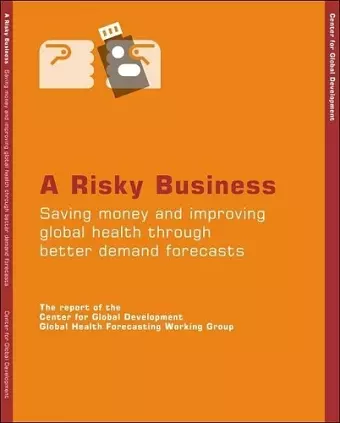A Risky Business
Saving Money and Improving Global Health Through Better Demand Forecasting
Center for Global Development Global Health Forecasting Working Group author
Format:Paperback
Publisher:Center for Global Development
Published:30th Sep '14
Currently unavailable, and unfortunately no date known when it will be back

Access to medicines is an issue of life or death for millions of people in poor countries. While great strides have been made in the last decade to improve health in poor countries - more aid funding for drugs and vaccines; creation of funds to buy medicines; and concessionary pricing of medicines by some pharmaceutical firms - the global supply chain that connects the dots – production to people – does not work well. The problem is poor forecasting of effective demand for products. Good forecasting is fundamental for key decisions, such as how much production capacity to build, which must be made years in advance of products being delivered. But donors that provide much of the money to purchase drugs, and a whole range of technical agencies and intermediaries, have yet to devise and coordinate among themselves, and with developing country governments, credible forecasts.
This report of the Global Health Forecasting Working Group, which was convened in early 2006 by senior fellow and director of programs Ruth Levine, provides an elegant analysis of the problem and a sensible agenda for action. Their report offers specific recommendations that apply across a range of products and that could be implemented by identifiable public and private organizations.
Among their recommendations is the creation of an “infomediary” - a neutral third party to collect and disseminate essential data for forecasting demand. Another recommendation is that donors who are the major purchasers should accept more of the risks associated with unforeseen shocks to actual demand - internalizing at least the shock that their own lack of predictable financing constitutes. That would imply, for example, that for some products donors move to contracts with manufacturers that include minimum quantity guarantees.
If these recommendations are implemented, manufacturers will benefit - in reduced risk in the production of medical technologies; the donors or ministries of health will benefit from more reliable and accurate information on the price and availability of essential products; and most important, millions of families in the developing world will benefit - in reduced disease and deaths and the personal agony those entail.
ISBN: 9781933286181
Dimensions: unknown
Weight: 500g
129 pages